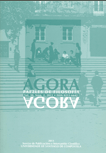ANÁLISIS FOUCAULTIANOS EN TORNO A LAS FRONTERAS CONTEMPORÁNEAS
Contenido principal del artículo
Resumen
Desde fines del siglo pasado, hemos sido testigos del pronunciado proceso de transformación, dispersión y heterogeneización que ha afectado a las fronteras contemporáneas. Este fenómeno ha suscitado la proliferación de numerosos trabajos que han procurado entenderlo a partir de diversas categorías pertenecientes al corpus conceptual foucaultiano. Este escrito se propone reunir algunas de estas líneas de investigación, mostrando la manera en que -nutriéndose ampliamente de los estudios desplegados en torno a la noción de seguridad- estas últimas han dado lugar a análisis más o menos resignificadores del concepto moderno de la frontera, ligado a la idea del confín o delimitación del Estado nacional.
Palabras clave:
Detalles del artículo
Referencias
Agamben, G, Homo Sacer. El poder soberano y la nuda vida I. Trad. A. G. Cuspinera. Valencia, Ed. Pre-Textos, 1998.
Agier, M, Managing the undesirables. Refugee Camps and Humanitarian Government. Cambridge, Polity Press, 2011.
Agier, M, Zonas de frontera. La antropología frente a la trampa identitaria. Trad. M. Gianni. Rosario, UNR Editora, 2015.
Arendt, H, Los orígenes del totalitarismo. Trad. G. Solana. Madrid, Taurus, 1974.
Balibar, E, “Fronteras del mundo, fronteras de la política”, Alteridades, vol. 15, n. 30 (2005), 87-96.
Bigo, D, “The Mobius Ribbon of Internal and External Security(ies)»”, en M. Albert, D. Jacobson, and Y. Lapid (eds.), Identities, Borders, Orders: Rethinking International Relations Theory, Mineapolis, University of Minnesota Press, 2001.
Campesi, G, “Migraciones, seguridad y confines en la teoría social contemporánea”, Crítica penal y poder 3 (2012), 166.
Dauphinee, E, “Living, dying, surviving II”, en E. Dauphinee and C. Masters (eds.), The Logics of Biopower and The War on Terror. Living, Dying, Surviving,New York, Palgrave MacMillan, 2007, pp. 229-244.
Dauphinee, E. y Masters, C, “Introduction: Living, dying, surviving I”, en E. Dauphinee and C. Masters (eds.), The Logics of Biopower and The War on Terror. Living, Dying, Surviving, New York, Palgrave MacMillan, 2007.
Derrida, J, Fuerza de ley. Trad. A. Baberá y P. Peñalver Gómez. Madrid, Tecnos, 1997.
Derrida, J, “Sobre la hospitalidad”, Entrevista en “Staccato”, programa TV de France Culture, 1997b. Edición digital de Derrida en castellano.
Fassin, D, La razón humanitaria. Trad. M. C. Padró. Madrid, Prometeo, 2016.
Foucault, M, «Preguntas a Michel Foucault sobre la geografía». En M. Foucault, Estrategias de poder. Obras esenciales, Volumen II. Paidós, 1999, Buenos Aires.
Foucault, M, Defender la sociedad. Trad. H. Pons. Buenos Aires, Fondo de Cultura Económica, 2010.
Foucault, M, Seguridad, territorio y población. Trad. H. Pons. Buenos Aires, FCE, 2016.
Foucault, M, Historia de la sexualidad I: La voluntad de saber. Trad. U. Guiñazú. Buenos Aires, Siglo Veintiuno, 2016b.
Foucault, M, El nacimiento de la biopolítica. Trad. H. Pons. Buenos Aires, FCE, 2021.
Isin, E. F. y Rygiel, K, “Abject spaces: frontiers, zones, camps”, en E. Dauphinee and C. Masters (eds.), The Logics of Biopower and The War on Terror. Living, Dying, Surviving, New York, Palgrave MacMillan, 2007, pp. 181-204.
Kalir, B, “Departheid. The Draconian Governance of Illegalized Migrants in Western States”, en Conflict and Society: Advances in Research 5 (2019), 19-40.
Mbembe, Necropolítica. Trad. E. F. Archambault. España, Ed. Melusina, 2011.
Mezzadra, S. y Neilson, B, La frontera como método. Trad. V. Hendel. Buenos Aires, Ed. Tinta Limón, 2016.
Mutimer, D, “Sovereign contradictions: Maher Arar and the indefinite future”, en E. Dauphinee and C. Masters, C. (eds.), The Logics of Biopower and The War on Terror. Living, Dying, Surviving, New York, Palgrave MacMillan, 2007, pp. 159-180.
Opitz, S. “Government Unlimited. The Security Dispositif of Iliberal Governmentality”, en U. Bröckling, S. Krassman and T. Lemke (eds.), Governmentality: Current Issues and Future Challenges, London, Routledge, 2011, pp. 93-114.
Orford, A. “Biopolitics and the tragic subject of Human Rights”, en E. Dauphinee, and C. Masters (eds.), The Logics of Biopower and The War on Terror. Living, Dying, Surviving, New York, Palgrave MacMillan, 2007, pp. 205-228.
Penchaszadeh, A. P. y Sferco, S, “Reflexiones filosófico-políticas en torno a la criminalización de las prácticas de solidaridad hacia migrantes y refugiados en la actualidad. El caso de Carola Rackete”, Historia y Sociedad 39 (2020), 213-240.
Revel, J, “Ne pas faire vivre et laisser mourir”, Esprit (2018).
Rodriguez, N, “The Battle for the border: Notes on autonomous migration, transnational communities and the state”, Social Justice 23 (2014), 21-39.
Salter, M, “The Global Visa Regime and the Political Technologies of the International Self: Borders, Bodies, Biopolitics”, Alternatives 2 (2006), vol. XXXI, 167-189.
Sassen, S, Territorio, autoridad y derechos. De los ensamblajes medievales a los ensamblajes globales. Trad. M. V. Rodil. Buenos Aires, Katz, 2010.
Schmitt, C, El nomos de la tierra: en el derecho de gentes del “Jus publicum europaeum”. Buenos Aires, Ed. Struhart, 2005.
Schmitt, C, Teología Política. Madrid, Trotta, 2009.
Vaughan-Williams, N, Border politics. The Limits of Sovereign Power. Edinburgh University Press, 2009.
Waever, O, “Securitization and Desecuritization”, en R. D. Lipschutz (ed.), On Security. New York, Columbia University Press, 1995, pp. 46-86.
Walters, W, “Border/Control”, European Journal of Social Theory 2, vol. IX, 2006, 187-203.
Walters, W, “Foucault and frontiers: Notes on the birth of the humanitarian border”, en U. Bröckling, S. Krassman and T. Lemke (eds.), Governmentality: Current Issues and Future Challenges, London, Routledge, 2011, pp. 93-114.







